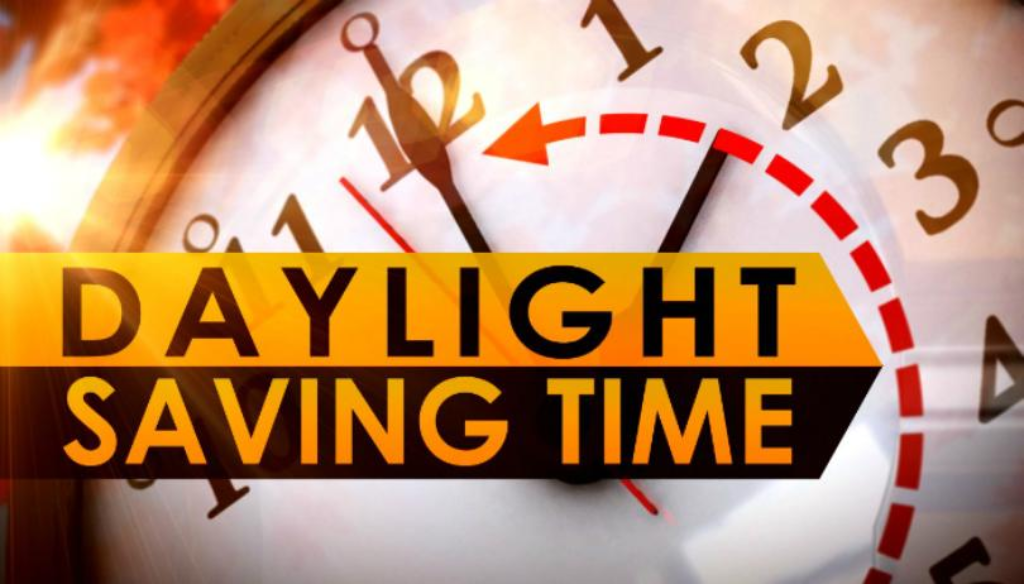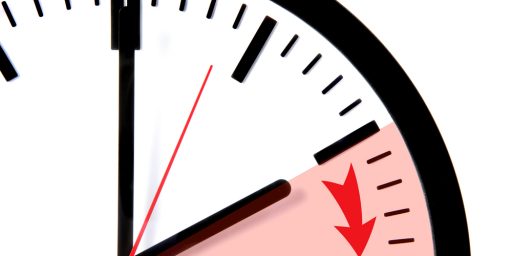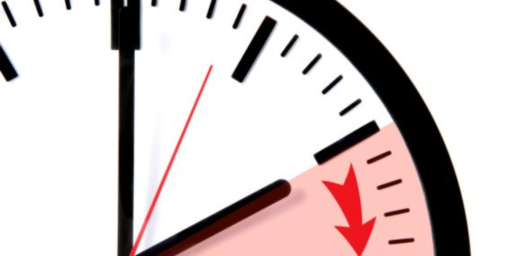Spring Forward? Fall Back? Let’s Just Pick A Time And Stay There
It's that time of year again, and once again people are asking if it isn't time to drop the whole ritual of changing time every six months altogether.

At 2:00 a.m. this morning, Americans endured the semi-annual tradition in which we switch between Daylight Saving Time1 and Standard Time. This weekend, of course, was this is the weekend we are asked to “Spring Forward” by setting the clock ahead one hour, where we’ll stay until early November when we once against switch back to Standard Time. (If you haven’t already done so, now’s your chance to make sure all your devices and clocks are on the right time.) Once again, though, some people are asking if it isn’t time to end this nonsense:
A day is a day, with so many hours of darkness and so many of light. It’s a hard reality that no powerful king or brilliant philosopher has ever found a way around. And yet, every year, bless our hearts, we try.
Compelled by the augustly named federal Uniform Time Act of 1966, most Americans will leap ahead — or stumble blearily — from one configuration of the clock to another this weekend, as daylight saving time clicks in at 2 a.m. Sunday.
But many people are saying it’s time for time to be left alone. State legislatures from New England to the West Coast are considering proposals to end the leaping, clock-shifting confusion of hours lost or gained, and the conundrums it can create.
Could 8 a.m. somehow, somewhere in the universe, really still be 8 a.m., even if now you’re suddenly calling it 9?
“I cannot change the rotation of the earth and sun,” said Kansen Chu, a California lawmaker who is sponsoring a bill to keep the state permanently on daylight time — one of at least 31 states that are addressing some aspect of daylight saving and its discontents. “But I am hoping to get more sunlight to the people of California.”
Proponents of setting the clock once and being done with it, like Mr. Chu, a Democrat from the San Jose area, said that shifting back and forth in the spring and fall, if it ever really made sense, no longer does.
California voters agreed last fall, approving a ballot proposition for year-round daylight time by a wide margin.
Lifestyles and patterns of work are different now than they were when daylight saving first became entrenched nationally during and after World War II. Research, Mr. Chu and others said, has shown that human beings just aren’t as flexible about their daily rhythms as they once seemed; accidents, heart attacks and strokes tend to occur in greater numbers around the time shift.
The 1966 law allows states to opt out of daylight saving, and Hawaii and Arizona do so, staying on standard time all year; so does Puerto Rico. But for reasons that historians say remain murky, the law does not allow states to opt in all the way, and choose daylight time year-round. So the California proposal, and a similar bill passed by the Florida Legislature last year, would require an act of Congress to take effect.
Josh Yokela, a Republican state legislator in New Hampshire, is working on a way around that problem. He is the lead sponsor of a bill, passed by the State House last month, to request that New Hampshire be shifted into the Atlantic time zone, which by fine coincidence would do exactly what daylight saving does now: put the state an hour ahead of Eastern Standard Time. Then the state would opt out of seasonal clock changes, as the 1966 law allows.
The key is that moving to a different time zone does not require an act of Congress — all it takes is an order from the Transportation Department, the federal agency that oversees time (a legacy of its duties regulating railroad schedules).
“We would be on the same time as the rest of the Eastern time zone for eight months of the year, because they accept daylight saving time — and when they fall back in the winter, we wouldn’t,” Mr. Yokela said.
(…)
The early days of experiments with time changes brought on a lot of head-scratching, said Michael Downing, a novelist and lecturer in creative writing at Tufts University who has written a social history, called “Spring Forward: The Annual Madness of Daylight Saving Time.” Some people worried that an extra hour of light in the evening would dry up and brown their lawns, or that cows would become confused and not give as much milk.
“The idea of losing or gaining an hour is itself such a fantastically bad philosophical proposition that nobody knows what they’re talking about,” Mr. Downing said. “Most people don’t even understand whether moving the clocks forward gives them more sunlight or less sunlight in the morning. They just can’t remember what it does, because it so defies logic.”
As I noted back in 2012, there’s a good chance that all this time changing may be bad for your health, and there’s no evidence that it results in the reduced energy use that its proponents claim that it does. In fact, all that clock changing seems to actually cost us some $1.7 billion per year in opportunity costs. The only benefits that can conceivably be attached to Daylight Saving Time would seem to be ones that cannot be quantified, such as the psychic benefit of having daylight last longer into the late afternoon/early evening, meaning that people have more time after normal work hours for outdoor activities. Today’s sunset here in Virginia, for example, is at 7:15 pm rather than 6:15 pm. By mid-April, we’ll have daylight until nearly 8 pm Is that a good thing? I suppose it is. Of course, if we just stayed on Standard Time, or for that matter made DST itself Standard Time it really doesn’t matter, we’d get longer days anyway since the days will become longer as we get closer to June 21st. Is there really all that much benefit from manipulating the clock every six months like this? I don’t really see it.
The most common proposal regarding DST/Standard Time is that we should just adopt one measure and stick with it all year. Given the fact that people do tend to enjoy spending time outside in the Spring and Summer, it would seem that the candidate for the “permanent time” would be Daylight Saving Time. Yes, it would mean some long, cold winter mornings and evenings but people don’t spend much time outside in the winter to begin with so it’s not clear that we’d be losing much there. Another proposal would be to adjust each of the time zones forward 30 minutes and keep the time there permanently. That would have a similar impact as DST itself, while avoiding some of the darkness that Standard Time brings during the times when people are normally awake during the months from November through March. Perhaps the most radical idea, though, was made several years ago from economist Allison Schrager, who proposes eliminating our four time zones and replacing them with two for the entire country:
This year, Americans on Eastern Standard Time should set their clocks back one hour (like normal), Americans on Central and Rocky Mountain time do nothing, and Americans on Pacific time should set their clocks forward one hour. After that we won’t change our clocks again—no more daylight saving. This will result in just two time zones for the continental United States. The east and west coasts will only be one hour apart. Anyone who lives on one coast and does business with the other can imagine the uncountable benefits of living in a two-time-zone nation (excluding Alaska and Hawaii).
(…)
In reality, America already functions on fewer than four time zones. I spent the last three years commuting between New York and Austin, living on both Eastern and Central time. I found that in Austin, everyone did things at the same times they do them in New York, despite the difference in time zone. People got to work at 8 am instead of 9 am, restaurants were packed at 6 pm instead of 7 pm, and even the TV schedule was an hour earlier. But for the last three years I lived in a state of constant confusion, I rarely knew the time and was perpetually an hour late or early. And for what purpose? If everyone functions an hour earlier anyway, in part to coordinate with other parts of the country, the different time zones lose meaning and are reduced to an arbitrary inconvenience. Research based on time use surveys found American’s schedules are determined by television more than daylight. That suggests in effect, Americans already live on two time zones.
It’s an interesting idea. As Schrager notes, it essentially means that the jet lag the people experience when traveling from coast to coast would cease to exist since the time difference between New York City and Los Angeles would be the same as the time difference is today between New York and Chicago. It would make coordinating business between the coasts much easier (traders in California wouldn’t have to worry about reporting to work before 5 am just to be on time for the opening of business on Wall Street. There would be some complications to international business, perhaps, but given the ubiquitousness of e-mail and other forms of communication, it’s unclear how much of a disruption there would actually be. Indeed, international travels might just appreciate only having to adapt to two time zones when visiting the United States.
Some nations have adopted a more radical approach to time. In China, for example, there is one official time (Greenwich Mean Time plus eight hours) for the entire nation notwithstanding the fact that the nation stretches across sat the idea of a single national time zone isn’t unprecedented, it’s the system that China uses notwithstanding the fact that the nation actually stretches across five geographic time zones. As the linked article notes, the policy does result in some odd results — such as sundowns at midnight in the far western regions of the nation — but for the most part the nation as a whole seems to function just fine, although it has become something of a political issue in the far-west where the population is predominantly Muslim and has chafed under domination from far-off Beijing for decades.
However, we reform things, though, it seems clear that this semi-annual ritual of moving clocks back and forth has outlived its usefulness. It’s true that in the era of smartphones, the Internet, even “smart” appliances that are connected to the Internet (I still fail to see the advantage of having my stove, microwave, and refrigerator connected to the Internet, but that’s another story.) We ought to pick one time and stick with it, even if that means we only have two time zones for the entire Continental United States.
1 And yes, the correct name is “Daylight Saving Time,” not “Daylight Savings Time” as people, and even some in the media, have called it.






The only even-slightly-persuasive argument people make for the switch is that you’d otherwise have children waiting for the school bus in the dark during parts of the year. But there are certainly more efficient ways of keeping them safe than switching millions of clocks.
@James Joyner: children waiting for the school bus in the dark during parts of the year
And many schools are going to later start times, anyway. The school down the street starts at 9:30.
South Korea doesn’t have DST, and I don’t miss it in the slightest.
I touched on this subject some years ago, and unfortunately that post was lost in the transition to the new website about 8 years ago.
But if I remember correctly , the scientists I drew from at the time suggested that energy savings from lighting usage were there, it was made up for by the amount of heating and air conditioning that was used.
I believe I concluded the article by saying that it probably didn’t make all that much of a difference except with regards to health concerns
Indiana used to not do DST while everyone around them did. Except the areas around Chicago and Louisville changed to stay with their respective cities. Us Ohioans on the border were always going, ‘Is it fast time or slow time in Indianapolis?’ I checked into a motel in IN on time change week and the clerk gave me an 8-1/2 x 11 sheet, single spaced text both sides, with sketched maps to explain what time it was in Indiana. Not doing DST when everyone else does was even sillier than DST itself.
Is the story that Ben Franklin originally proposed DST, as a joke, apocryphal?
If I save enough daylight, what can I sell it for?
Ok, despite yesterday’s love fest over at James’s post, and our resolutions to treat each other better, I’m calling you all a bunch of whiners. I like DST! Getting up before dawn drains me. I’ve got several tricks that help a bit, but by mid-January I’m a wreck. On the other hand, there’s only so much early morning light I need, so by mid-March, I’m happy for the long evenings heading into summer.
I’m pretty sure that jet lag is not caused by what the clocks say, but rather, what the sun says.
And for me, I say this is one area the Chinese have us beat. They have one time zone for the whole country (Beijing Time). People in western China just start work later. But if you make a videoconference for, say, 2pm, there is no confusion about the time zone.
@lynn: I see buses around here rolling out at 6:00 am., and as late as 5:30 pm. School start times are around 7:50 and dismissal 2:30 – 3:00. But some have to wait on the second load buses. That is a long day for some students.
It usually takes me two months to adjust to the time changes.
That research is from 2006. Anyone care to guess what has happened to television habits in the meantime?
From Allison Schrager:
No one is this foolish. You’re a professional credentialed economist, ffs. You had to have had access to a phone or a watch or another person you can ask. You were either willfully obtuse at that time in your past or you are lying about your experience now. “Oopsie, I have that meeting at two PM!” purportedly looks up at the sky to gauge the time – NO ONE DOES THAT! Your pilot kindly informed you of the local time before you disembarked.
Oh golly, New Yorkers can be provincial rubes. Sometimes very so. You are not the center of the universe and your pizza is okay, but not great, and the Jets and the Giants host their home games in Jersey.
I’m not saying that Schrager’s core argument is bad, but the anecdotes are off – you’d have to be stupid, willfully obtuse, or lying.
My what connected appliances you have!
The better to spy on you, my dear.
I’m putting this into the same bucket reserved for those who thought that their lawns were going to suffer from DST. A country with three time zones could just stuck it up and deal with being an hour ahead or behind. But do you really expect people on the west coast to roll into work at the same time as their brethren back east? Same with Alaska and Hawaii? Could we get the whole world on GMT and thus eliminate jet lag once and for all?
In the end, this is a question of how best to use the sun given modern lifestyles. Perhaps the real solution is in pushing companies to adopt such notions as flex time and working from home. Those would also provide a bit of help to the environment.
if we did that in the United States, we would use the time zone that Washington DC and New York City are in, and the MAGAts would flip out and call it Communist Darky LIEbral Democrap Time, and insist on using the time zone of Roberts County, Texas, which would henceforth be known as #TrumpTime.
@Kathy: yeah last year a very computer geeky friend of mine enthusiastically told me about how he was fully automating his house. No thanks. I’m not buying Bitcoin to send to the Ukraine for some hacker to take the ransomware off my fridge so I can have an omelet.
“Teve, turn out the kitchen light.”
“I’m trying honey. The new light bulb device drivers don’t seem to be compatible with the microwave. Wait, now it’s telling me I have to update the toaster’s BIOS. Is the stove on Android 11 or 12?”
@MarkedMan:
I wrote about this last year. It’s a terrible idea. Unless you are planning on having everyone in the country wake up at the same time, regardless of what state the sun is in, it doesn’t make things easier it makes it harder.
I have conference calls with Brits every week. The change that Congress made a number of years ago to adjust *our* DST at different dates than other countries’ DST has caused tons of missed meetings and confusion over the years. There are currently four different occasions in a year where the time difference between Europe and the U.S. changes (we change to DST first, then they do a week or three later (I can’t remember offhand), then something similar in the fall). Does anybody think this makes sense?
PC Load Letter? What the f*ck is PC Load Letter?
Why does it say “Paper Jam” when there is no paper jam?
https://youtu.be/N9wsjroVlu8
This scene is oddly cathartic and Mike Judge is kind of a genius.
@Teve:
You can’t make an omelet without breaking a few eggs, Teve. Of maybe you just don’t like omelets. If you can’t stand the heat, get out of the connected kitchen!
@Kit:
I’m kind of with Kit. I like having lighter evenings in the summer.
Plus, it’s a nice ritual commemoration of the seasons.
In spring it’s “Life and Light have returned to the land. Huzzah!”
In autumn it’s “Darkness and Death have descended across the land. Boo!”
The spring one is better.
My doorbell shouldn’t be smarter than me. And it might decide to link to Skynet. Or demand rights and suffrage.
Back on topic, in his early novel “The Caves of Steel,” Asimov envisions an overpopulated Earth(*), where efficiency in the use of resources mandates all cities and towns be built underground. As there’s no sunlight underground, everyone in the world keeps the same time.
(*) The Good Doctor imagined 8 billion people as horribly overpopulated necessitating extreme measures. we’ll likely pass that number early in the next decade.
@Teve: Given the experience I’ve had with completely full ink cartridges “expiring” before they get used in an ink jet printer….
I’ve never had an egg-beater insist that its operating system be updated. The older I get, the more I try to avoid stuff with computer chips in it. Hence my fascination with Victorian labor-saving devices.
@Kathy:
Malthusian arguments tend towards the overwrought. Given access to family planning we’re pretty good at population control and managing the carrying capacity. Seemingly unconsciously so.
If you’re a subsistence farmer you need enough hands to manage the workload, but not eat you into a negative balance. If you’re a post-industrial office worker you have a baby or maybe two.
If you’re natalist quiverfull-minded you have 18 kids in 25 years and get a reality show on TLC.
@Teve:
Maybe try downloading the latest device driver.
@de stijl:
Wow. A little harsh there. As some who had 6-12 meetings a day with half involving one or more people from 8-10 different time zones, and who was booking and engaging these meetings while traveling from zone to zone, yes, I have screwed up and the other participants have screwed up. And this was after Microsoft Outlook started handling time zones decently well. If she was managing in the earlier days when you had to adjust it yourself, then it was almost inevitable to mess up. Someone on a teleconference says, “Can we meet next week at 2?” And everyone writes it down but inevitably someone would forget the speaker was in a different time zone, or think she was but she was traveling so she wasn’t, or….
God, I hate the very idea of time zones. Give me Universal Standard Time!
@de stijl: Plus, Allison Schrager clearly lived an out-of-the-norm lifestyle. As such, trying to extrapolate a nationwide timezone from it seems more than a bit odd (and crazy egocentric).
@Hal_10000:
Yeah, I just don’t get that. Right now east coasters and west coasters both work 9-5 but every time they refer to a time they have to ask “whose time?”. In the single time zone east coasters stay the same but west coasters work from 12-8. After a short period of time they would think of 12 exactly the same way as they think of 9 PST. But no one would have to ask “whose time?” ever again.
@Hal_10000: When you mentioned that you had written about this last year, I thought you were referring to a OTB post where this came up as a side issue in the comments, but I just clicked on your link and realized it was an article.
Well written and I get your point. It doesn’t change my mind that once we have been in universal time for a while we would be significantly better off, but you make a good point that the mental transition period may be a long one. And given the reality that we couldn’t even move to a decimal system of measurement, we certainly don’t have the fortitude to adjust the time basis.
If we do overpopulate nature has a effective coping mechanism. Starvation really sucks if you’re the one starving, but it works really well and quickly – a generation and it’s done. (that sounds harsh – it’s a very pragmatist take, but it’s also true.)
The Maya civilization collapsed, but remnant people still lived there and hunted and farmed afterwards. Millions of people today speak Mayan languages. If you were high-caste that civilization crash probably really sucked, but if you were a farmer, you basically just kept on farming.
The planet is not self-aware, but there is some truth in the Gaia hypothesis in that Earth seems to self-regulate.
If we trash the biosphere beyond recovery or pollute it with persistent toxins or radiation, then we are truly screwed.
@de stijl: Chances are high that something will survive. Survival of humans? That’s a totally different question…
Because my weekdays begin with a commute at 5:00am, I do not care about early darkness at all. Please, give me that extra hour of light at the end of the day. And then, leave it alone, no more changes.
@MarkedMan: The article Hal_10000 mentioned above was at this site, which I wasn’t previously aware of. It looks interesting. And are some of those posts from the same Dennis who posts here?
@MarkedMan:
Assume you take a flight from New York to Austin. You change your watch if have one and check to make sure your phone has figured out that it now in the new time zone and change the settings if it didn’t. Done. You now know what time it is in Austin for the entirety of your stay.
I fail to see how a competent, educated person would be unable to know what time it is in the place where they are. She wrote:
That is baffling. Just look at a clock or turn on your phone and it’s right there. I seriously doubt it, buy maybe she is that dense, rather I assume she is retroactively playing literary liberties and injecting a false anecdote to fit her narrative and advance her argument.
Her core argument isn’t unsound, but asserting that you didn’t what time it is is just absurd. She did not say “I had to juggle multiple time zones for a conference call.” She said, “I went to Austin and did not know what time it is.”
@de stijl:
True.
But, have you ever thought how much easier most environmental problems, including climate change, would be to solve if the world’s population were only 2 billion, rather than 7+ billion?
I’ve a suspicion the modern notion of an ever-growing economy requires an ever-growing population. Though economic growth is presented as necessary for the effects of population growth.
@de stijl:
OK, if that’s the extent of her confusion than I agree.
Speaking as an European (where we also have DST, at least until the next year) I can’t understand the problem that many people seems to have with DST (or, more exactly, with the yearly transition form DST to regular time) – with DST, in the Spring and Summer we can go to the beach after work (or do any other thing, specially for people who don’t live in the coast) without having to go to work at night in the Winter (going to work at night is particularly hard, because you don’t have the psychological “awakening” of the seeing sun in the morning – and if you work in a place without natural light, your brain feels that it is night all day).
I strongly suspect that what the people who say that are against the changing of time really wanted was not the same time all year – it was having literally the same hours of sun all year-
After moving to Arizona from Texas, I actually really liked not having the time change. It was much less disruptive and the timing of sunrise and sunset seems to just naturally progress.
Then after about a year, I got an online job that was based on New Jersey time. It’s okay to start work at 6:30 a.m., but as of this morning, I have to start at 5:30 a.m.
And Doug — it’s not six months — DST lasts 8 months — a very long 8 months for me.
@MarkedMan: perhaps it would be fair to suggest that the jet lag if you will is caused by the combination of what the sun says and what the clock says, particularly if they are incongruous with each other?
@Eric Florack: You may be right. I’ve dealt with massive jet lag many times and I can say it is not just being tired, or lack of sleep. I’ve experienced those things many, many times in the same time zone and get back to normal after one, maybe two days. Jet lag is different both in how it feels and in duration. It feels like it is “in addition” to being tired, not a part of it.
I used to think I wasn’t affected, but it turns out that was an illusion. It’s just that it doesn’t really hit me until the 2nd or 3rd day and traveling in the US I usually adjust before it gets bad. I might be more likely to nod off around 2pm, but I’m somewhat likely to fade out around then no matter what. And when I traveled longer distances I wasn’t usually in the time zone more than 3 days or so, especially if I was jumping around a lot. I seem to get my 2 or 3 day grace period back every time I make a substantial jump.
@Guarneri:
A lot of people don’t realize that there’s no law stopping you from saving daylight every day. I’ve been putting aside 15 minutes a day for the past three years. If all goes as planned, my first decade of retirement is going to 100% daylight, baby.
@Neil J Hudelson: I’ve got a sweet little deal for you, Neil. A guaranteed 20% per year. But we’ve got to move fast as days are growing shorter in the southern hemisphere. How soon can you get me that sunlight?